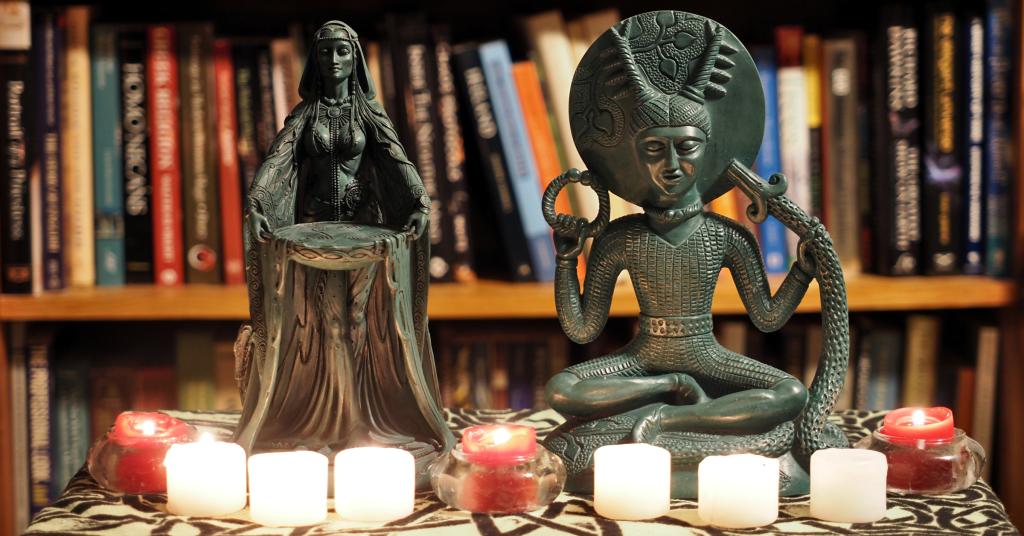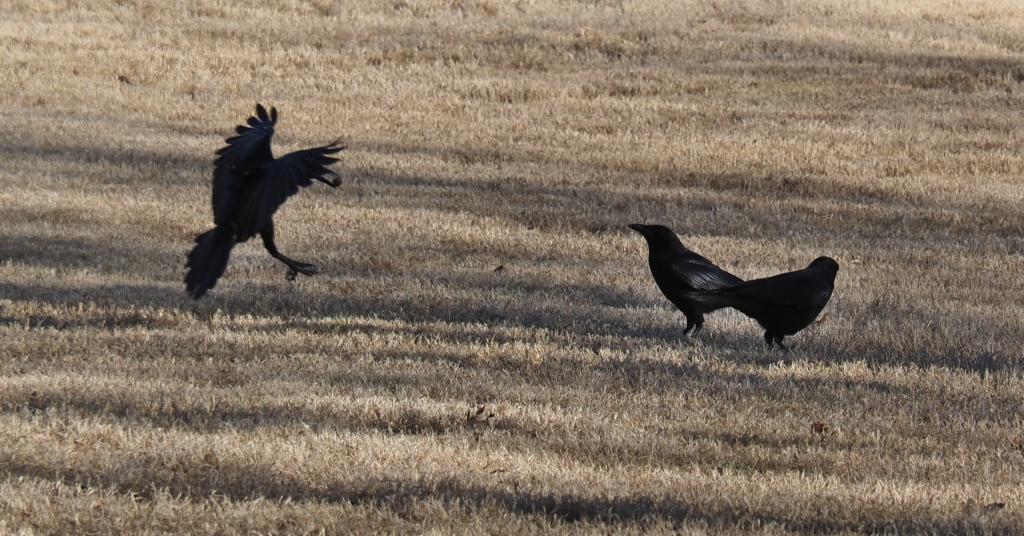A question I hear from time to time asks “how do I connect to a God for whom there is little or no lore?”
On one hand, this question shows the importance of stories in religious practice. In ancient times these stories were passed down from parent to child, and from traveler to host. In our time they’re mostly passed down through books. And while I love books, I don’t love the way our society privileges and idolizes the written word. I covered that a few years ago in Paganism and the Primacy of the Written Word – I’m not going to replow that ground today.
Instead, I want to address this question directly, in part because it’s very relevant to me. I’m a devotee and a priest of Cernunnos and of Danu, Gods for whom there is very little lore. Despite that (or perhaps, because of it), Cernunnos has developed a large number of followers in the modern Pagan movement, and Danu is hardly unknown.

Lore is just the record of other peoples’ experiences
Most Pagans are quick to say that the stories of our ancestors are not scripture.
But we live in a society where the dominant religion (Christianity) has scripture and the dominant variant of it (Protestantism, especially Evangelical Protestantism) values scripture over all other sources of religious authority. Lots of people think a “real” religion has to have a holy book.
It takes a conscious effort to get out of that mindset.
That starts by understanding that all lore is the record of someone else’s religious experiences. That’s true whether the stories are historical or mythical, whether their origin is a single person or an entire culture.
But it’s been canonized by time
Lore tells us how our ancestors understood and related to their Gods. That’s a treasure, particularly for those of us who are re-creating and reimagining religions that weren’t actively practiced for a thousand years or more. The authors of those stories lived in a society where polytheism was a foundational assumption, not a “quaint” or “heretical” deviation from monotheism and atheism.
I think that’s the most valuable thing we can gain from reading lore. Not the specifics of what to wear, where to stand, and what to say, but the mindset of people for whom the reality of the Gods was assumed from birth through death.
Of course, the specifics can be helpful too. Where we have lore, it can help us know something about the deities who spark our interest and whose voices we hear.
But the absence of lore doesn’t mean we have nothing, just like not having a holy book doesn’t mean we aren’t practicing a “real” religion.
Look for what lore there is
The name “Cernunnos” is mentioned only once, on the Pillar of the Boatmen, a Gaulish – Roman sculpture in what’s now France. The image on the Gundestrup Cauldron – that’s on the pendant I sometimes wear – is probably Cernunnos, but we can’t be sure.
That’s not much, but it’s something.
Look for stories and artwork. Read academic works of literature, history, and archaeology. You’re not going to find a how-to manual, but you may very well find something that points you in a helpful direction.
Look for similar deities in nearby cultures
Few cultures existed in isolation, and where there is contact there is always borrowing and blending. Did a nearby culture have a God who did similar things in similar ways? That can’t tell us everything we want to know, but it can point us in the right direction.
Beware of assuming that a such a deity is the same God under a different name. Maybe They are and maybe They aren’t. Our well-intended desire to find commonalities shouldn’t lead us to wiping away important distinctions between individuals.
Find the others
Not all resources are in the distant past. Some of them are active here and now – many of them can be found with Google.
Whether the Old Gods ever really went away or not, there is no debating They’re active now. If a God is calling you, or if you feel an interest in pursuing a God, odds are good you’re not the only one. Someone else is asking these same questions right now. And likely, some of them are ahead of you by a year or two or so.
So find them. The internet, search engines, and social media make this far, far easier than it was even 20 years ago, much less 50. Talk to these people and find out what they’re doing. See what works for them and what doesn’t.
You don’t have to take on everything they’re doing… nor should you. If it doesn’t make sense to you, or if it just doesn’t feel right, don’t do it.
But it helps to not do this alone.
Pray and meditate
Going back to the idea that lore is the record of someone else’s experience – how about having your own experience?
That starts with prayer and meditation. So long as you’re reverent, there’s no wrong way to pray. Ask the God in question to speak to you. Ask what They want in offerings. Ask Them how you can be a part of Their work in this world.
And then listen. Sit quietly and focus your attention on Them. If you don’t have a statue (especially if there are no statues for this God) then use a candle, or a piece of paper with Their name written on it. Or just sit and listen.
The Gods with whom I’m acquainted tend to be subtle, especially with beginners. They seem to want us to work to figure out who They are and how we should relate to Them. I don’t know why.
I do know that if you do the work, most times They’ll respond. You just have to listen closely enough to hear what They’re saying.
Experiment
Most Pagans ignore any call for orthodoxy and reject any attempt to establish it. And yet we still wonder “how should I do this?”
My suggestion is to review the resources you have, think it through, come up with a plan, review it to make sure it makes sense, and then give it a try.
If it works, great – you’ve learned something. If it doesn’t work, not so great – but you’ve learned something just the same. Our Gods are not looking to smite beginners who make honest mistakes.
Offerings, worship and ritual, invocations, virtues and values, this-world actions: which ones bring helpful results and strengthen your relationship with your God? Keep doing them, and see how you can take them farther and deeper. Which ones bring unhelpful results and strain your relationship? Stop doing them and try something else.
Remember that all lore began with someone’s experience. Our ancestors did it – so can’t we.
Publish your work
Keep a journal. Take good notes. And when you’ve got something useful, share it.
This is how we rebuild our Pagan and polytheist religions for our time. Not by mindlessly copying what someone in another culture in another millennium did (thought that’s a good place to start, when we know what it is), but by figuring out how best to relate to our Gods, ancestors, other spirits, and each other – here and now.
What you share can be helpful to those who come after you.
Have confidence and humility
I’m happy to see people approaching this question seriously, and I appreciate the care and cautiousness people bring to this work. If you’re not a little nervous, you probably don’t understand the magnitude of what you’re doing.
That doesn’t mean you should be tentative or scared.
Have the confidence that if a God wants you to work for Them, follow Them, worship Them, They’ll make it possible for you to find or figure out everything you need. They’re unlikely to hand it to you, but they’ll make it possible. Expect that They’ll be patient (but try not to make the same mistakes twice). Mainly, have the confidence that you can do what needs to be done.
And also, remember that you’re an imperfect human dealing with matters that people have struggled with for at least as long as we’ve been human. You will make mistakes. You will get some stuff wrong. When you discover errors – or when errors are pointed out to you – make changes.
You’ll never get it all right. Just keep working to get as close to “right” as you can.
This is the work of new beginnings
There are times when I’m envious of the large religions – the ones with plenty of physical infrastructure, established priesthoods and other institutions, and centuries of continuous practice. The ones where you can plug in at whatever level you’re called to be and get plenty of support.
But those aren’t the religions – or the Gods – that call to me.
This is what I’m called to do and I’m honored to do it.
If you’re called to help establish or re-establish the worship of a deity for whom there is little lore, you’ve got a lot of work in front of you. But it’s doable work. What an amazing opportunity to make a difference for the future.
May your holy work be blessed.




















